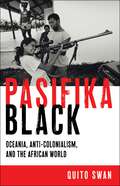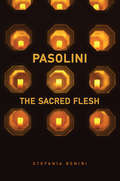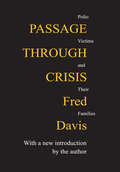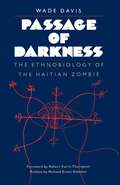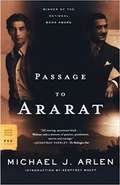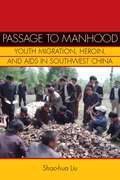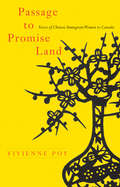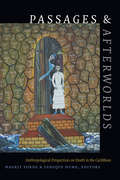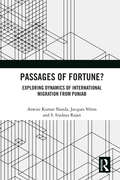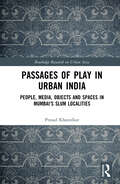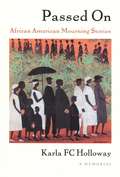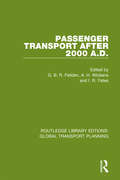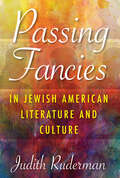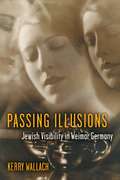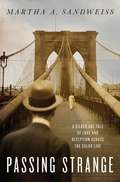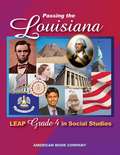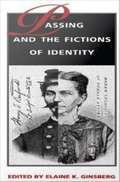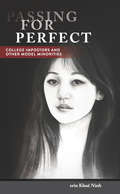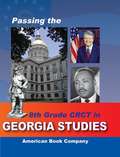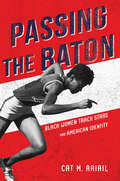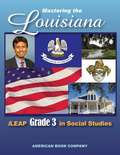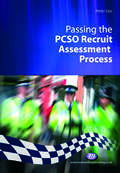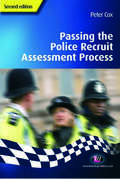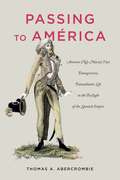- Table View
- List View
Pasifika Black: Oceania, Anti-colonialism, and the African World (Black Power #5)
by Quito SwanASALH 2023 Book Prize WinnerA lively living history of anti-colonialist movements across the Atlantic, Pacific, and Indian OceansOceania is a vast sea of islands, large scale political struggles and immensely significant historical phenomena. Pasifika Black is a compelling history of understudied anti-colonial movements in this region, exploring how indigenous Oceanic activists intentionally forged international connections with the African world in their fights for liberation.Drawing from research conducted across Fiji, Australia, Vanuatu, Papua New Guinea, Britain, and the United States, Quito Swan shows how liberation struggles in Oceania actively engaged Black internationalism in their diverse battles against colonial rule. Pasifika Black features as its protagonists Oceania's many playwrights, organizers, religious leaders, scholars, Black Power advocates, musicians, environmental justice activists, feminists, and revolutionaries who carried the banners of Black liberation across the globe. It puts artists like Aboriginal poet Oodgeroo Noonuccal and her 1976 call for a Black Pacific into an extended conversation with Nigeria’s Wole Soyinka, the Nuclear Free and Independent Pacific’s Amelia Rokotuivuna, Samoa’s Albert Wendt, African American anthropologist Angela Gilliam, the NAACP’s Roy Wilkins, West Papua’s Ben Tanggahma, New Caledonia’s Déwé Gorodey, and Polynesian Panther Will ‘Ilolahia. In so doing, Swan displays the links Oceanic activists consciously and painstakingly formed in order to connect Black metropoles across the Atlantic, Pacific, and Indian Oceans.In a world grappling with the global significance of Black Lives Matter and state-sanctioned violence against Black and Brown bodies, Pasifika Black is a both triumphant history and tragic reminder of the ongoing quests for decolonization in Oceania, the African world, and the Global South.
Pasolini
by Stefania BeniniPoet, novelist, dramatist, polemicist, and filmmaker Pier Paolo Pasolini continues to be one of the most influential intellectuals of post-war Italy. In Pasolini: The Sacred Flesh, Stefania Benini examines his corporeal vision of the sacred, focusing on his immanent interpretation of the Christian doctrine of the Incarnation and the "sacred flesh" of Christ in both Passion and Death as the subproletarian flesh of the outcast at the margins of capitalism.By investigating the many crucifixions within Pasolini's poems, novels, films, cinematic scripts and treatments, as well as his subversive hagiographies of criminal or crazed saints, Benini illuminates the radical politics embedded within Pasolini's adoption of Christian themes. Drawing on the work of theorists such as Ernesto De Martino, Mircea Eliade, Jean-Luc Nancy, Alain Badiou, Giorgio Agamben, and Slavoj Žižek, she shows how Pasolini's meditation on the disappearance of the sacred in our times and its return as a haunting revenant, a threatening disruption of capitalist society, foreshadows current debates on the status of the sacred in our postmodern world.
Passage Through Crisis: Polio Victims and Their Families
by Fred DavisBased on a study of fourteen families in which a child had contracted paralytic poliomyelitis. Passage Through Crisis: Polio Victims and Their Families, first published in 1963, was widely praised for its penetrating--and, for its time, innovative--analyses of doctor-patient communications, and for its interpreta-tion of the meaning of physical disability in American society. In his new opening essay, Davis reflects on the enduring sources of this profound problem in human relations as well as on those changes in the culture of American health care that are helping to restructure doctor-patient relations along more open, less authoritarian lines. The emergence of patient self-help groups, the political militancy of the Gay community in regard to AIDS, and the fading of the early post-World War II naive faith in the humanitarian efficacy of science are some of the developments dealt with. A parallel discussion of the importation into medical sociology of such concepts as the reality-structuring power of professional discourse and of the meta-phoric significance of different diseases for different historical eras seeks to relate developments in the culture of health care to sociology's study. Passage Through Crisis retains for today's readers that essential quality that most engaged readers of a quarter century ago: its vivid and probing ethno-graphic account of the impact of serious illness on the family, the difficult processes of adjustment that ensue and, in these connections, the role played (and toll exacted) by American values.
Passage of Darkness
by Wade DavisIn 1982, Harvard-trained ethnobotanist Wade Davis traveled into the Haitian countryside to research reports of zombies--the infamous living dead of Haitian folklore. A report by a team of physicians of a verifiable case of zombification led him to try to obtain the poison associated with the process and examine it for potential medical use.Interdisciplinary in nature, this study reveals a network of power relations reaching all levels of Haitian political life. It sheds light on recent Haitian political history, including the meteoric rise under Duvalier of the Tonton Macoute. By explaining zombification as a rational process within the context of traditional Vodoun society, Davis demystifies one of the most exploited of folk beliefs, one that has been used to denigrate an entire people and their religion.
Passage to Ararat
by Michael J. ArlenIn Passage to Ararat, Michael J. Arlen goes beyond the portrait of his father, the famous Anglo-Armenian novelist of the 1920s, that he created in Exiles to try to discover what his father had tried to forget: Armenia and what it meant to be an Armenian, a descendant of a proud people whom conquerors had for centuries tried to exterminate. But perhaps most affectingly, Arlen tells a story as large as a whole people yet as personal as the uneasy bond between a father and a son, offering a masterful account of the affirmation and pain of kinship.<P><P> Winner of the National Book Award
Passage to Manhood: Youth Migration, Heroin, and AIDS in Southwest China
by Shao-Hua LiuPassage to Manhood addresses the intersection of modernity, heroin use, and HIV/AIDS as they are embodied in a new rite-of-passage among young men in the Sichuan province of southwestern China. Through a nuanced analysis of the Nuosu population, this book seeks to answer why the Nuosu has a disproportionately large number of opiate users and HIV positive individuals relative to others in Sichuan. By focusing on the experiences of Nuosu migrants and drug users, it shows how multiple modernities, individual yearnings, and societal resilience have become entwined in the Nuosu's calamitous encounter with the Chinese state and, after long suppression, their efforts at cultural reconstruction. This ethnography pits the Nuosu youths' adventures, as part of their passage to manhood, against the drastic social changes in their community and, more broadly, China over the last half century. It offers fascinating material for courses on migration, globalization, youth culture, public health, and development at both undergraduate and graduate levels.
Passage to Promise Land: Voices of Chinese Immigrant Women to Canada
by Vivienne PoySpanning more than six decades, Passage to Promise Land is a revealing study of Chinese immigration to Canada from the end of the Second World War to the present day. Tracing the evolution of immigration policy through the stories of Chinese immigrant women, Vivienne Poy captures the social, political, and ethnic tensions of the period. Although the narratives included here represent women of all ages and educational backgrounds, they share a common sense of determination and spirited resilience in the face of hardship. Through their stories we learn about Chinese settlement experience, how the Chinese community developed alongside changes in immigration regulations, and why the immigration of Chinese families to Canada became commonplace in the 1970s. The women address experiences of patriarchy and discrimination in both China and Canada, revive memories of the turbulent years in China at the end of the Pacific War, and speak of their uncertainties about the return of Hong Kong's sovereignty from the United Kingdom to China in 1997. From the very first mention of Chinese women's immigration in Canada's Parliament in 1879, to the end of the twentieth century - when a Chinese woman was appointed Governor General - the road to equality has been long and arduous. Passage to Promise Land details the important events along the way through the voices of the women themselves.
Passages and Afterworlds: Anthropological Perspectives on Death in the Caribbean (Religious Cultures of African and African Diaspora People)
by Maarit Forde Yanique HumeThe contributors to Passages and Afterworlds explore death and its rituals across the Caribbean, drawing on ethnographic theories shaped by a deep understanding of the region's long history of violent encounters, exploitation, and cultural diversity. Examining the relationship between living bodies and the spirits of the dead, the contributors investigate the changes in cosmologies and rituals in the cultural sphere of death in relation to political developments, state violence, legislation, policing, and identity politics. Contributors address topics that range from the ever-evolving role of divinized spirits in Haiti and the contemporary mortuary practice of Indo-Trinidadians to funerary ceremonies in rural Jamaica and ancestor cults in Maroon culture in Suriname. Questions of alterity, difference, and hierarchy underlie these discussions of how racial, cultural, and class differences have been deployed in ritual practice and how such rituals have been governed in the colonial and postcolonial Caribbean. Contributors. Donald Cosentino, Maarit Forde, Yanique Hume, Paul Christopher Johnson, Aisha Khan, Keith McNeal, George Mentore, Richard Price, Karen Richman, Ineke (Wilhelmina) van Wetering, Bonno (H.U.E.) Thoden van Velzen
Passages of Fortune?: Exploring Dynamics of International Migration from Punjab
by S. Irudaya Rajan Jacques Véron Aswini Kumar NandaThis book examines international out-migration from North India, focusing on the state of Punjab. It is the first-ever empirical exploration of the causes, processes, patterns and consequences of international out-migration based on a robust sample of 10,000 households drawn from both rural and urban areas. The volume explores a range of issues such as current migration, return migration, remittances, reverse remittances, diaspora philanthropy, migration consultancy services, international marriages, campaigns for safe migration abroad and plans for emigration in future. It also addresses questions surrounding the use of paid labour by households to replace the work done by the emigrants and studies villages as the migration setting. Additionally, the book organically links to a well-spread-out and vibrant Punjabi diaspora, as well as providing viable baseline data on a range of indicators. A key text on migration studies, this volume will be of great interest to scholars and researchers of development studies, economics, demography, sociology, social anthropology and diaspora studies.
Passages of Play in Urban India: People, Media, Objects and Spaces in Mumbai's Slum Localities (Routledge Research on Urban Asia)
by Prasad KhanolkarIn this book, Prasad Khanolkar offers a new way of thinking about ‘slums’ and southern cities based on a grounded engagement with the relationship between media, objects, spaces, and people in the everyday life of slum localities in Mumbai, India. Over the past few decades, Mumbai, like many cities in the global South, has experienced a series of overarching governmental missions to program it into an interoperable and profitable city. Its ‘slums’, which house a majority of its population don’t fit within the dominant registers and continue to be deemed as excess. Urban residents inhabiting Mumbai’s slum localities thus find themselves in the middle of missions, policies, and programs that are not of their making, just as often that they find themselves localized by lack of resources, caste system, communal conflicts, and territorial jurisdictions. Drawing on extensive fieldwork in slum localities of Mumbai, this book explores how its residents engage in different forms of play in order to extend and expand their field of possibilities, despite the limitations and fixities. The book attends to some of these playacts: imparting stories with different thicknesses, rehearsing roles on and offscreen, engaging in deceptive performances, experimenting with repetitive everyday rhythms, and recycling matter and forms. Through these playacts, urban residents explore the virtual abilities of different mediums to put bodies, objects, and spaces into new forms of relationships and create passages to depart from programmed urban futures. By attending to these proliferating urban passages of different residents in slum localities, the book makes a case for rethinking southern cities as mediums for urban lives to converge and depart without an overarching framework. The book makes a significant contribution in the field of urban studies, urban anthropology, urban geography, and urban sociology. It will be of interest to scholars and students working on postcolonial cities, Southern urbanisms, infrastructure studies, and urban planning in the global South.
Passed On: African American Mourning Stories
by Karla Fc HollowayPassed On is a portrait of death and dying in twentieth-century African America. Through poignant reflection and thorough investigation of the myths, rituals, economics, and politics of African American mourning and burial practices, Karla FC Holloway finds that ways of dying are just as much a part of black identity as ways of living. Gracefully interweaving interviews, archival research, and analyses of literature, film, and music, Holloway shows how the vulnerability of African Americans to untimely death is inextricably linked to how black culture represents itself and is represented. With a focus on the "death-care" industry--black funeral homes and morticians, the history of the profession and its practices--Holloway examines all facets of the burial business, from physicians, hospital chaplains, and hospice administrators, to embalming- chemical salesmen, casket makers, and funeral directors, to grieving relatives. She uses narrative, photographs, and images to summon a painful history of lynchings, white rage and riot, medical malpractice and neglect, executions, and neighborhood violence. Specialized caskets sold to African Americans, formal burial photos of infants, and deathbed stories, unveil a glimpse of the graveyards and burial sites of African America, along with burial rituals and funeral ceremonies. Revealing both unexpected humor and anticipated tragedy, Holloway tells a story of the experiences of black folk in the funeral profession and its clientele. She also reluctantly shares the story of her son and the way his death moved her research from page to person. In the conclusion, which follows a sermon delivered by Maurice O. Wallace at the funeral for the author's son, Bem, Holloway strives to commemorate--through observation, ceremony, and the calling of others to remembrance and celebration.
Passenger Transport After 2000 A.D. (Routledge Library Edtions: Global Transport Planning #9)
by G. B. R. Feilden, A. H. Wickens and I. R. YatesOriginally published in 1995 this book provides an authoritative and stimulating account of the issues and problems facing transport planners in the 21st century. The contributors – leading authorities from North America and Europe – put forward a wide range of points from which future technical developments and transport will be approached. They review the ways in which human needs and national expectations can be served by technological developments in the 21st Century.
Passing Fancies in Jewish American Literature and Culture (Jewish Literature and Culture)
by Judith RudermanThis scholarly study explores the conflicting forces of assimilation and cultural heritage in literary portrayals of Jewish American identity.In Passing Fancies in Jewish American Literature and Culture Judith Ruderman takes on the fraught question of who passes for Jewish in American literature and culture. In today’s contemporary political climate, religious and racial identities are being reconceived as responses to culture and environment, rather than essential qualities. Many Jews continue to hold conflicting ideas about their identity?seeking deep engagement with Jewish history and the experiences of the Jewish people while holding steadfastly to the understanding that identity is fluid and multivalent.Looking at carefully chosen texts from American literature, Ruderman elaborates on the strategies Jews have used to “pass” from the late nineteenth century to the present?nose jobs, renaming, clothing changes, religious and racial reclassification, and even playing baseball. While traversing racial and religious identities has always been a feature of America’s nation of immigrants, Ruderman shows how the complexities of identity formation and deformation are critically relevant during this important cultural moment.
Passing Illusions: Jewish Visibility in Weimar Germany
by Kerry WallachWeimar Germany (1919–33) was an era of equal rights for women and minorities, but also of growing antisemitism and hostility toward the Jewish population. This led some Jews to want to pass or be perceived as non-Jews; yet there were still occasions when it was beneficial to be openly Jewish. Being visible as a Jew often involved appearing simultaneously non-Jewish and Jewish. Passing Illusions examines the constructs of German-Jewish visibility during the Weimar Republic and explores the controversial aspects of this identity—and the complex reasons many decided to conceal or reveal themselves as Jewish. Focusing on racial stereotypes, Kerry Wallach outlines the key elements of visibility, invisibility, and the ways Jewishness was detected and presented through a broad selection of historical sources including periodicals, personal memoirs, and archival documents, as well as cultural texts including works of fiction, anecdotes, images, advertisements, performances, and films. Twenty black-and-white illustrations (photographs, works of art, cartoons, advertisements, film stills) complement the book’s analysis of visual culture.
Passing Strange: A Gilded Age Tale of Love and Deception Across the Color Line
by Martha A. Sandweiss"Passing Strange" is a uniquely American biography of Clarence King, who hid a secret from his Gilded Age cohorts and prominent family: for 13 years he lived a double life--as the celebrated white explorer, geologist, and writer King and as a black Pullman porter and steelworker named James Todd.
Passing The Louisiana Leap Grade 4 In Social Studies
by Kindred HowardLouisana LEAP Grade 4 in Social Studies Test Preparation
Passing and the Fictions of Identity
by Elaine K. GinsbergPassing refers to the process whereby a person of one race, gender, nationality, or sexual orientation adopts the guise of another. Historically, this has often involved black slaves passing as white in order to gain their freedom. More generally, it has served as a way for women and people of color to access male or white privilege. In their examination of this practice of crossing boundaries, the contributors to this volume offer a unique perspective for studying the construction and meaning of personal and cultural identities. These essays consider a wide range of texts and moments from colonial times to the present that raise significant questions about the political motivations inherent in the origins and maintenance of identity categories and boundaries. Through discussions of such literary works as Running a Thousand Miles for Freedom, The Autobiography of an Ex-Coloured Man, Uncle Tom's Cabin, The Hidden Hand, Black Like Me, and Giovanni's Room, the authors examine issues of power and privilege and ways in which passing might challenge the often rigid structures of identity politics. Their interrogation of the semiotics of behavior, dress, language, and the body itself contributes significantly to an understanding of national, racial, gender, and sexual identity in American literature and culture. Contextualizing and building on the theoretical work of such scholars as Judith Butler, Diana Fuss, Marjorie Garber, and Henry Louis Gates Jr. , Passing and the Fictions of Identity will be of value to students and scholars working in the areas of race, gender, and identity theory, as well as U. S. history and literature. Contributors. Martha Cutter, Katharine Nicholson Ings, Samira Kawash, Adrian Piper, Valerie Rohy, Marion Rust, Julia Stern, Gayle Wald, Ellen M. Weinauer, Elizabeth Young
Passing for Perfect: College Impostors and Other Model Minorities (Asian American History & Cultu)
by erin Khuê NinhIn her engaging study, Passing for Perfect,erin Khuê Ninh considers the factors that drove college imposters such as Azia Kim—who pretended to be a Stanford freshman—and Jennifer Pan—who hired a hitman to kill her parents before they found out she had never received her high school diploma—to extreme lengths to appear successful. Why would someone make such an illogical choice? And how do they stage these lies so convincingly, and for so long? These outlier examples prompt Ninh to address the larger issue of the pressures and difficulties of striving to be model minority, where failure is too ruinous to admit. Passing for Perfect insists that being a “model minority” is not a “myth,” but coded into one’s programming as an identity—a set of convictions and aspirations, regardless of present socioeconomic status or future attainability—and that the true cost of turning children into high-achieving professionals may be higher than anyone can bear. Ninh’s book codifies for readers the difference between imposters who are con artists or shysters and those who don’t know how to stop passing for perfect.
Passing the 8th Grade CRCT in Georgia Studies
by Kindred Howard Ernest Everett Blevins Sandra Bassett Meredith Barr [et al.]Passing the 8th Grade CRCT in Georgia Studies will help students who are learning or reviewing material for the test in social studies. The materials in this book are based on the testing standards as published by the Georgia Department of Education. This book contains several sections. These sections are as follows: 1) general information about the book; 2) a Diagnostic Test; 3) an Evaluation Chart; 4) chapters that teach the concepts and skills that improve graduation readiness; 5) two Practice Tests. Answers to the tests and exercises are in a separate manual. The answer manual also contains a Chart of Standards for teachers to make a more precise diagnosis of student needs and assignments.
Passing the Baton: Black Women Track Stars and American Identity (Sport and Society)
by Cat M. AriailAfter World War II, the United States used international sport to promote democratic values and its image of an ideal citizen. But African American women excelling in track and field upset such notions. Cat M. Ariail examines how athletes such as Alice Coachman, Mae Faggs, and Wilma Rudolph forced American sport cultures—both white and Black—to reckon with the athleticism of African American women. Marginalized still further in a low-profile sport, young Black women nonetheless bypassed barriers to represent their country. Their athletic success soon threatened postwar America's dominant ideas about race, gender, sexuality, and national identity. As Ariail shows, the wider culture defused these radical challenges by locking the athletes within roles that stressed conservative forms of femininity, blackness, and citizenship. A rare exploration of African American women athletes and national identity, Passing the Baton reveals young Black women as active agents in the remaking of what it means to be American.
Passing the Louisiana iLeap Grade 3 in Social Studies
by Kindred HowardPassing the Louisiana iLEAP Grade 3 in Social Studies will help students who are learning or reviewing material for the iLEAP. The materials in this book are based on the testing standards as published by the Louisiana Department of Education. This book contains several sections. These sections are as follows: 1) general information about the book; 2) a diagnostic test; 3) an evaluation chart; 4) chapters that teach the concepts and skills that improve test readiness; 5) two practice tests. Answers to the tests and exercises are in a separate manual.
Passing the PCSO Recruit Assessment Process (Practical Policing Skills Series)
by Peter CoxWith practical tips to help with written exercises, interview technique and role plays, this book clearly explains the new nationwide PCSO assessment system. Packed with advice, and including coverage of the National Competencies for the PCSO role, this manual guides the reader on how to succeed at every stage, from completing the application pack to preparing for and passing the written assessment exercises.
Passing the Police Recruit Assessment Process (Practical Policing Skills Series)
by Peter CoxThis practical and accessible book is an essential purchase for anyone applying to become a police officer. With competition for jobs increasing, thorough preparation prior to assessment is more important than ever. This book is full of clear advice and guidance as well as providing essential practice in all areas of the recruitment process, from completing the application form, excelling at the written and verbal exercises, to passing the psychometric tests. Carefully structured around the seven core competencies assessed during recruitment, the book reinforces the skills and understandings necessary to become a police officer while increasing individual confidence and competence.
Passing to América: Antonio (Née María) Yta’s Transgressive, Transatlantic Life in the Twilight of the Spanish Empire
by Thomas A. AbercrombieIn 1803 in the colonial South American city of La Plata, Doña Martina Vilvado y Balverde presented herself to church and crown officials to denounce her husband of more than four years, Don Antonio Yta, as a “woman in disguise.” Forced to submit to a medical inspection that revealed a woman’s body, Don Antonio confessed to having been María Yta, but continued to assert his maleness and claimed to have a functional “member” that appeared, he said, when necessary.Passing to América is at once a historical biography and an in-depth examination of the sex/gender complex in an era before “gender” had been divorced from “sex.” The book presents readers with the original court docket, including Don Antonio’s extended confession, in which he tells his life story, and the equally extraordinary biographical sketch offered by Felipa Ybañez of her “son María,” both in English translation and the original Spanish. Thomas A. Abercrombie’s analysis not only grapples with how to understand the sex/gender system within the Spanish Atlantic empire at the turn of the nineteenth century but also explores what Antonio/María and contemporaries can teach us about the complexities of the relationship between sex and gender today.Passing to América brings to light a previously obscure case of gender transgression and puts Don Antonio’s life into its social and historical context in order to explore the meaning of “trans” identity in Spain and its American colonies. This accessible and intriguing study provides new insight into historical and contemporary gender construction that will interest students and scholars of gender studies and colonial Spanish literature and history.
Passing to América: Antonio (Née María) Yta’s Transgressive, Transatlantic Life in the Twilight of the Spanish Empire
by Thomas A. AbercrombieIn 1803 in the colonial South American city of La Plata, Doña Martina Vilvado y Balverde presented herself to church and crown officials to denounce her husband of more than four years, Don Antonio Yta, as a “woman in disguise.” Forced to submit to a medical inspection that revealed a woman’s body, Don Antonio confessed to having been María Yta, but continued to assert his maleness and claimed to have a functional “member” that appeared, he said, when necessary.Passing to América is at once a historical biography and an in-depth examination of the sex/gender complex in an era before “gender” had been divorced from “sex.” The book presents readers with the original court docket, including Don Antonio’s extended confession, in which he tells his life story, and the equally extraordinary biographical sketch offered by Felipa Ybañez of her “son María,” both in English translation and the original Spanish. Thomas A. Abercrombie’s analysis not only grapples with how to understand the sex/gender system within the Spanish Atlantic empire at the turn of the nineteenth century but also explores what Antonio/María and contemporaries can teach us about the complexities of the relationship between sex and gender today.Passing to América brings to light a previously obscure case of gender transgression and puts Don Antonio’s life into its social and historical context in order to explore the meaning of “trans” identity in Spain and its American colonies. This accessible and intriguing study provides new insight into historical and contemporary gender construction that will interest students and scholars of gender studies and colonial Spanish literature and history.This book is freely available in an open access edition thanks to TOME (Toward an Open Monograph Ecosystem)—a collaboration of the Association of American Universities, the Association of University Presses and the Association of Research Libraries—and the generous support of New York University. Learn more at the TOME website: openmonographs.org.
